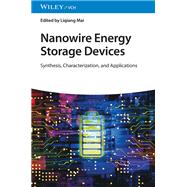Comprehensive resource providing in-depth knowledge about nanowire-based energy storage technologies
Nanowire Energy Storage Devices focuses on the energy storage applications of nanowires, covering the synthesis and principles of nanowire electrode materials and their characterization, and performance control. Major parts of the book are devoted to the applications of nanowire-based ion batteries, high energy batteries, supercapacitors, micro-nano energy storage devices, and flexible energy storage devices The book also addresses global energy challenges by explaining how nanowires allow for the design and fabrication of devices that provide sustainable energy generation.
With contributions from the founders of the field of nanowire technology, Nanowire Energy Storage Devices covers topics such as:
- Physical and chemical properties, thermodynamics, and kinetics of one-dimensional nanomaterials, and basic performance parameters of one-dimensional nanomaterials electrochemical energy storage devices
- Conventional, porous, hierarchical, heterogeneous, and hollow nanomaterials, and in-situ electron microscopic and spectroscopy characterization
- Electrochemistry, advantages, and issues of lithium-ion batteries, unique characteristic of nanowires for lithium-ion batteries, and nanowires as anodes in lithium-ion batteries
- Nanowires for other energy storage devices, including metal-air, polyvalent ion, alkaline, and sodium/lithium-sulfur batteries
Elucidating the design, synthesis, and energy storage applications, Nanowire Energy Storage Devices is an essential resource for materials scientists, electrochemists, electrical engineers, and solid state physicists.









